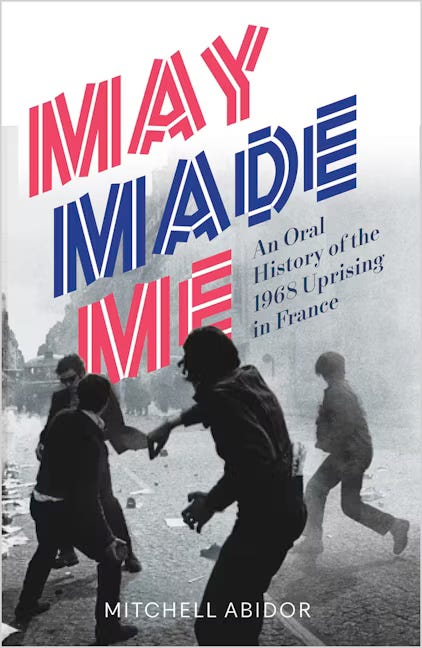Thoughts on May Made Me
Short Review of May Made Me: An Oral History of the 1968 Uprising in France and More May Made Me: Additional Elements of an Oral History of the 1968 Uprising in France by Mitchell Abidor
Image description: Picture of the book cover, which consists of the book title above an image of protestors engaging in street battles with French police in the streets of Paris during the French May 1968 uprising.
These two books have several merits. First, it has a timeline of events as well as an introductory essay that provides important historical information and context about the French May 1968 uprising.
Second, it outlines what France was like prior to the uprising through the interviewees discussing their lives and political activities pre-1968.
Third, it exhaustively details what happened in the uprising through the interviewees outlining what they did during it and how it ended for them.
Fourth, it critically evaluates how the uprising changed French society through the interviewees reflecting on how the uprising changed them personally and politically and its impacts on French society.
Fifth, it effectively cuts against the grain of most histories of the uprising that focus on the students and their leaders through its selection of participants being such that out of 30 interviewees, only two have spoken publicly about their participation in the uprising.
Sixth, it provides a refreshing alternative to most histories of the uprising focusing on what happened in Paris through interviewing a range of participants who were involved in the uprising in cities and towns outside of Paris.
Seventh, it examines how the uprising impacted French film through some of the interviewees discussing how they filmed the uprising and how this impacted both their career in film as well as how the uprising subsequently influenced French cinema.
However, these two books also have their issues. First, the introductory essay’s argument that while the French Communist Party did take measures to stop the uprising turning into a revolution, the ultimate reason why it didn’t turn into a revolution was because the French workers were not revolutionary and that the PCF understood lacks a strong evidential basis, as it does not critically evaluate the historiography of the uprising and does not use a wide range of primary and secondary sources on the uprising in support of this argument.
Second, while it aims to center the voices of those not usually included in histories of the uprising, there are some clear omissions that impede it from fully achieving this. More specifically, most of the interviewees are men, from a student background, are white, while most of the workers interviewed reflect the author’s position on the uprising. Those who are not interviewed are workers who opposed ending the strikes and workplace occupations and collectively organised to try to stop this, the Arab, Polish and other migrant workers and students in France at the time, the responses of women to the sexual escapades of the male workers and students interviewed or the homosexuals who would go on to create the homosexual liberation movement after the uprising.
Third, while the author’s questions to the interviewees are mostly open-ended, there are multiple instances of him shifting to quite narrow lines of questioning that aim to nudge the interviewees to try to answer in a manner that support’s the author’s perspective on the uprising.
Fourth, given how much the conflict between the different political tendencies in the uprising are discussed by the interviewees, the introductory essay could have done more to discuss the political composition of the uprising and how it was a factor in the uprising’s development and end. As it lacks this, I would recommend doing some reading about the uprising before reading these two books in order to have a basic understanding of the uprising, which will allow you to get the most out of these texts.
Overall, I’d recommend these two books, as they provided an accessible and insightful oral history about the French May 1968 uprising.


